June 2023
What does social pedagogy have to offer a wide range of professions?


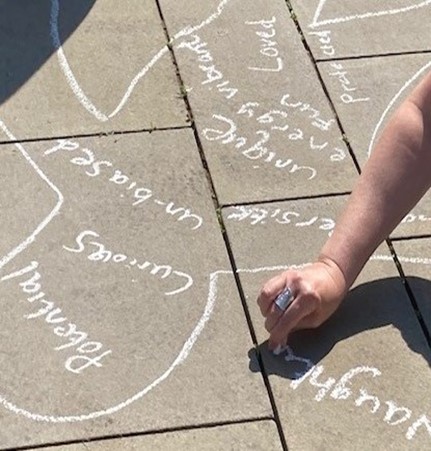

Introduction
The University of Worcester led social pedagogy networking event brought together a vibrant group of people from a diverse range of professions; from adoption services, to play advocates to those lecturing in the field of business management. Everyone who attended was united in the core purpose of recognising the richness and potentiality of the individuals that they encounter daily, particularly the marginalised. This gathering was part of an international delegation, one of many taking place simultaneously in different locations across the UK and Europe, with each separate network event connecting virtually with one another during the day to share ideas, tell stories and build community.
The event introduced and explored some core values that underpin social pedagogy. We listened as experts discussed how they came to hold their beliefs about human beings and their potential to impact positively on one another, challenging our propensity to define individuals by their need.

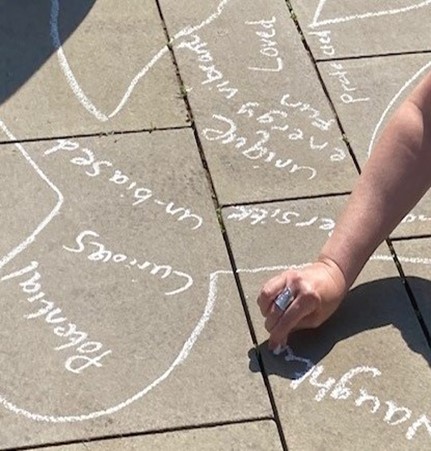
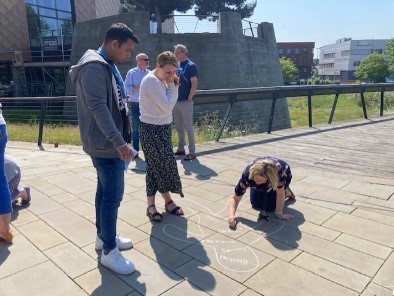
The delegates then split into small groups and took part in a creative activity involving drawing a chalk outline of a child/person who may be considered marginalised. Inside the silhouette the groups wrote words associated with qualities that make people rich. After a short time, the groups then wrote words outside of the image that depicted society’s attitudes towards marginalised people. The delegates were given time to actively review and record their experience using Greenaway’s Four Fs (2015) as prompts, specifically,
1. Facts: what have you noticed based on your observations and what you’ve seen in other groups’ artwork?
2. Feelings: what emotions does this bring up in you?
3. Findings: what learning are you taking from the activity?
4. Futures: how can you help draw out people’s inner richness and make this more visible?
Key take-away points from the day included:
Process of drawing- its significance for supporting understanding and engagement
The physical action of drawing the outline of the person and writing words inside to depict their inner richness seemed to enable participants to mentally inhabit the life-space of the imaginary, disadvantaged person. Several delegates noted that they had reflected on their own lived experiences as a way of making the activity more concrete for them. Words describing the inner richness of the marginalised person included, “playful”, “curious”, “loved” and “kind”, as well as “complex” and “unique”, evidence that delegates were avoiding thinking in two dimensions.
When the groups added the deficit words, such as “snowflake”, “disruptive”, “demanding” around the outside of their drawing, the impact was felt personally. Reflecting on this later using the Four Fs (Greenaway 2015) delegates’ feelings ranged from “sad” and “disappointed”; “anger” and “rage,” to “hope”, “empowerment” and “radicalism”. Although there was anger directed at society, some participants noted that we all have prejudices, and so should guard against the polarising action of labelling anyone, including those whose values and actions we might dislike. At the same time there was hope and a feeling of empowerment in joining forces with like-minded others to take a stand against such prejudice and injustice.
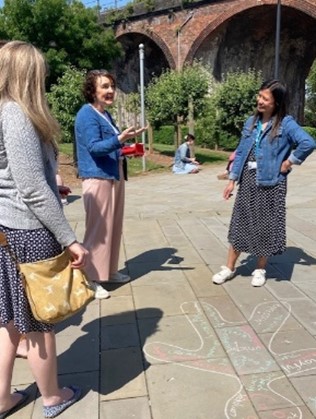

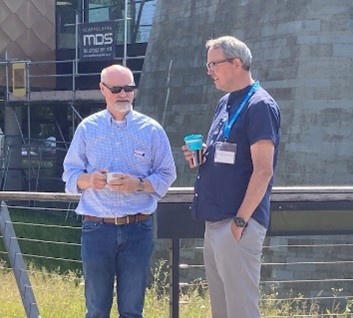
The importance of relationships
This related both to the delight of connecting with others who held similar values and hopes, as noted by the comment “We’ve found our tribe”, as well as the wider aspect of relationships. One observation about the importance of “community” reminds us of the power that comes when we feel we belong. Positive relationships enhance our confidence, boost resilience, development, and growth (Kyridis et.al., 2015: Vincent, 2016) and are at the heart of social pedagogy.
Challenging assumptions and the power of ‘pause’
Several of the groups noted the need to challenge assumptions and reflect on where our prejudices originate. They wrote that before thinking, speaking, or making judgements about people we should “pause”, and ask, “what is their lived reality?” Pausing is a powerful tool that creates a “deliberate gap” before impulsively reacting to an emotional trigger, allowing us to redirect our responses to ones that are more intentional (Segail, 2023, no page) and aligned to our Haltung. During a pause we can take a breath and mindfully interrupt a cycle of learned behaviour, adjusting negative thoughts to be more empathetic and emotionally in-tune with others. The simple action of pausing can provide a space for us to have more authentic relationships with others.
Get to know the individual
Quite a few groups wrote that a way to find the richness in people was to get to know them as an individual before being tempted to make judgements. One group discussed how potential is often hidden, lying latent within a person, suggesting that it sometimes takes effort to discover it. Social pedagogy proposes that everyone possesses “inner richness and potential” (Eichsteller, nd, p.1), and creating the conditions for this to thrive is our role as social pedagogues.
Insight into how this might be achieved was addressed by several groups. One proposed that valuing diversity and celebrating differences, rather than merely accepting them was important. This reminds us how language can influence attitudes in subtle ways; the word ‘accept’ implies politely enduring. It is a passive behaviour whereas when we ‘celebrate’ individuals’ differences we actively show support, love and admiration for them. A tight smile versus party poppers.
The active nature of fostering human richness through positive relationships was evidenced by groups who included comments such as “Dialogue,” “Active listening”, “Sharing”, “Respecting”, “Questioning”, “Having a genuine interest” and being “Open to learn” as future actions. These verbs suggest a need to invest something of our ‘self’, responding with agility to how others are presenting in the moment. This can be both exhilarating and exhausting, and while relationship skills can be taught, (Barton 2014) it is the desire and courage to break down barriers and initiate relationships, particularly with the marginalised, that is perhaps the starting point for coming to know people as individuals. Engaging effectively in this way requires a combination of both skills and disposition.
When we consider this, it is little wonder that another group included “Reflection” and “Self-awareness” as guiding principles for those seeking to “get to know the individual”. Using the Three Ps as a framework (Professional, Personal and Private selves) can help ensure that we bring genuine emotion to the relationship, using our personality and personability in a professional way, but judging when personal aspects of our lives would not enhance the marginalised person’s experience, and so should be kept private (Eichsteller and Holthoff, 2011).
Activism as future action, with a caution
Delegates in many groups identified a desire to challenge societal attitudes towards the marginalised and key to this was developing confidence. It was acknowledged that supporting marginalised people is easier said than done, and that once we see injustice, we need to look for strength both inwards and outwards from our support networks to rally our confidence, rather than quietly look away.
This take away for the future was extended by another group who saw the need for “tackling barriers- not just individual; structural issues,” highlighting that effective action requires lobbying those who are able to make policy changes on a macro level as well as providing support for the individual: “Political awareness and individual resourcefulness collectively and individual development”, agreed another group.

Delving deeper into the complexities of activism some delegates added that the stance of “saviour” should be avoided. This is a pertinent reminder of the need for continual self-reflection to ensure that we are ethical in our work with marginalised groups, honestly questioning our motives to establish if we are looking for a personal dopamine hit disguised as a worthy quest to “make a difference” (Cole, 2012. No page). In our first responsibility to “do no harm” we should enable the people we work with to feel empowered by including them in decisions that affect their lives, trusting their competence to be involved and ensuring that we “work with” others rather than “do to” them. When we encourage individuals to look to, and to utilise, their own community’s strengths, we can avoid creating a dependence that might be well-meaning, but ultimately becomes debilitating and is therefore unethical. Eichsteller and Bradt (2019, p.15) argue that although we may act as “the lifeline in crisis” on occasion, it is vital that we are also “strengthening people’s safety net and helping them recognise that they, in turn, can be part of other people’s safety net too”. It is important to remember that our ultimate aim is to make ourselves redundant, so that what is done together the first time is done independently the second time (Storo, 2013).
So, what does social pedagogy have to offer a range of professions?
The delegates at the event came from a broad range of professions and it was energising to feel the buzz as inspiration and insight into how social pedagogy might apply to each person’s context were sparked. There are few job roles that do not involve working with people, and feedback from delegates reflected the potential of social pedagogy to offer “an integrative and coherent perspective on supporting learning, well-being and social inclusion both through relationship-centred practice and structural efforts to address social inequality and promote social change.” (Eichsteller and Bradt, 2019, p.14).
If we were to create a metaphorical Pinterest board of life in the UK over the last seven years or so we would perhaps conclude that the local and global political situation has often divided people and exacerbated the difficulties in their lives (or life worlds).


Social Pedagogy may not be a panacea to all these problems, but perhaps if we adopted social pedagogical values instead, our future might look a little different. Social pedagogy seeks ways to build common ground, bridging previous divides in an attempt to construct interdependent common futures. Adopting a collective and agreed Haltung across all professions and institutions, committing to enhancing financial, cultural and human capital in communities would surely be a positive start. Social Pedagogy offers huge potential to all professions and professionals who are invested in the betterment of our world. A potentiality that we will continue to explore here at the University of Worcester as part of our Social Pedagogy Research Group.
If you would like to find out more about our Social Pedagogy Research Group, then please contact Carla Solvason (Group Lead) at: c.solvason@worc.ac.uk
And look out for our book which is in production, Social Pedagogy: Possibilities in Education, edited by members of the research group.
References
Barton. E. (2014) The secret of nimble workplaces. BBC online. Available from: https://www.bbc.com/worklife/article/20141215-do-you-need-a-fresh-start accessed 18.07.23
Cole, Teju. 2012. The White Savior Industrial Complex. The Atlantic Monthly Online 21: 1–2
Eichsteller, G. [nd] Social Pedagogy – Discovering Young People’s Potential. ThemPra Social Pedagogy CIC. Available from: www.thempra.org.uk/wp-content/uploads/2016/01/Social-Pedagogy-briefing-paper.pdf accessed 18.07.23
Eichsteller, G. & Holthoff, S. (2011). Conceptual Foundations of Social Pedagogy: A Transnational Perspective from Germany, in Cameron, C. & Moss, P. (2011). Social Pedagogy and Working with Children and Young People. London: Jessica Kingsley Publishers.
Eichsteller, G. & Bradt, L. (2019). Social Pedagogy as a Meaningful Perspective for Education and Social Care. Anglesey: Thempra Social Pedagogy.
Kyridis, A., Christodoulou, A., Vamvakidou, I., Pavlis-Korres, M. (2015). ‘Fighting Corruption: Values Education and Social Pedagogy in Greece in the Middle of the Crisis.’ International Journal of Social Pedagogy, 4(1): 3, pp. 24–42. DOI: https://doi.org/10.14324/111.444.ijsp.2015.v4.1.003.
Greenaway, R., Bogdan, V., & Calin, I. (2015). Active Reviewing: A Practical Guide for Trainers and Facilitators. CreateSpace Independent Publishing Platform.
Segail, I. (2023). PAUSE: The EQ Key to Mindful Decision-Making. Available from: https://www.linkedin.com/pulse/pause-eq-key-mindful-decision-making-ian-segail accessed 18.07.23
Storo, J. (2013). Practical Social Pedagogy. Theories, values and tools for working with children and young people. Bristol: Policy Press
Vincent, J. (2016). Perspectives on love as a component of professional practice. [Joint Special Issue, Love in Professional Practice] Scottish Journal of Residential Child Care, 15(3) and International Journal of Social Pedagogy, 5(1), 6-21.
